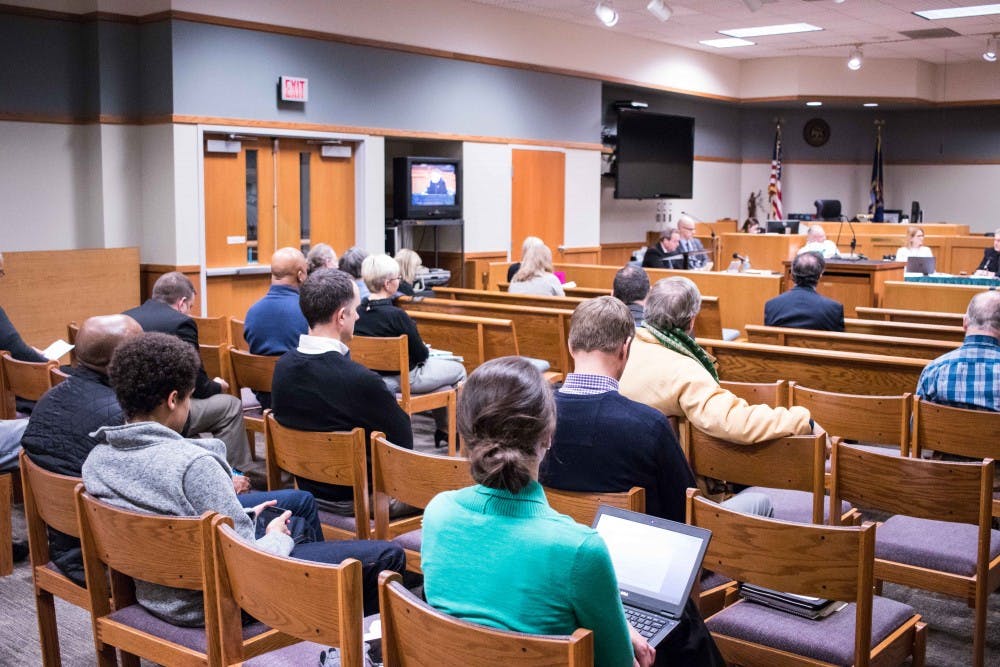East Lansing City Council discussed how it plans to fund three crucial areas — parking, community development and capital improvements — at Tuesday's budget work session. Here are the main takeaways from the meeting:
Community development

East Lansing City Council discussed how it plans to fund three crucial areas — parking, community development and capital improvements — at Tuesday's budget work session. Here are the main takeaways from the meeting:
Community development
Director of Planning, Building and Development Tim Dempsey said his staff had hoped to recommend more funding for human service agencies under the federal Community Development Block Grant. But the city decided not to in favor of focusing on infrastructure projects and Avondale Square payments.
Councilmember Aaron Stephens said he agreed the money should be reserved for infrastructure.
"Allocating that infrastructure in trying times — I don't think that's an unreasonable thing," Stephens said.
He was worried, however, the city hadn't been clear enough with the human service agencies in cutting the funding.
Toward the end of the meeting, one resident read a letter to council detailing her problems with the decision, which included the lack of clarity.
Dana Watson serves on the Community Development Advisory Committee, which is responsible for reviewing applications for human service projects. She said some agencies fully expected to receive the grant funding and already had been planning what to do with it.
"After taking their staff time and resources to apply for funds ... they even showed up to thank us for the funds we anticipated providing," Watson said.
Watson stressed the funding would all go toward improvements benefiting lower-income residents, and asked council to reconsider how they'd assigned the block grants.
"When something has to be cut, and the full chop is to our social service groups — which affect our low-to-moderate income people — both economic inequality and access inequity is upheld by policy decisions," Watson said.
It did seem unfair to the agencies who had already spent time allocating funds just to have it taken away, councilmember Shanna Draheim said.
Yet she still supported dedicating the block grant funds solely to infrastructure projects.
Draheim said since residents were facing major cuts to services already, it was important to at least supply them with improved infrastructure She added that she was inclined to put that money toward sidewalks.
"I normally would say let's put it off, but I think this is an important cut we need to make this year," Draheim said.
Capital Improvements
The Avondale Square redevelopment project is expected to continue being a financial loss for the city until 2036, Dempsey said.
The project began in 2004, with major land acquisitions coming in 2006. By the time the Great Recession tanked property values in 2008, the city was too far along to look back.
Avondale was a financial mistake in the long run, councilmember Ruth Beier said.
Beier didn't want to ask residents for more revenues — like a new income tax — without admitting when the city makes mistakes, she said.
Support student media! Please consider donating to The State News and help fund the future of journalism.
"We didn't know it at the time, but as long as I'm on council, I'm not going to get into something like this again," Beier said. "I don't think we have the expertise or the debt capacity to make this kind of mistake."
Beier was not on council as the Avondale project was being approved.
Mayor Mark Meadows, who served as mayor from 1997 to 2005 before returning in 2015, said hindsight was 20/20. He said he didn't believe the decision to move forward on Avondale Square looked as bad when it was being made.
However, he said the city has learned from the experience, and agreed it would likely be a long while before similar projects would even be discussed.
Outside of Avondale Square, other proposed capital improvement projects include upgrading the Hannah Center sound system at a cost of $50,000 and replacing the doors at Fire Station 1, which would cost $35,000.
Parking
Additional parking revenue has been coming in from meters thanks to the construction workers downtown, Dempsey said.
That's important, because construction is also a major cause of decreased revenue in other areas. Lot 1 was the city's top parking revenue generator, but it was shut down as part of the Center City construction.
Residents seem to hate the city's fee increases for regular parking implemented last year, but East Lansing parking administrator Caleb Sharrow said he thinks that might have had some benefits, as the city isn't "maxing out" the number of available parking permits.
"We did get quite a substantial amount of negative feedback," Sharrow said. "But as of right now ... we're hovering at a spot where we're very comfortable and we're not proposing any further rate increases for this year."